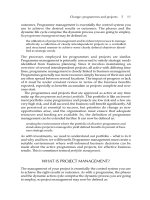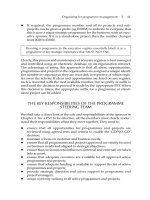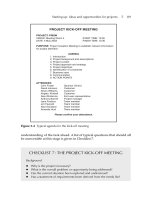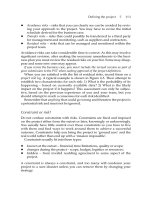50 little things that make a big difference to team motivation and leadership phần 10 pot
Bạn đang xem bản rút gọn của tài liệu. Xem và tải ngay bản đầy đủ của tài liệu tại đây (649.91 KB, 9 trang )
109
Debate, democracy, and freedom of discussion are messy. They can’t
be restricted to the clean lines of official talk. As we all know, a little dirt
is good for us and in environments that are clinically clean and
wholesome there tends to be a lack of soul. An
indiscretion is that little piece of dirt that keeps us
alive, fresh, and well—and prevents us being
turned into robots, programmed to think and
behave exactly as our masters require.
There are unspoken rules, of course. The
indiscretion should never be malicious, never
knowingly deceitful let alone vindictive. Its purpose
is to keep people fresh, so that they are completely up-to-date with the
unofficial news ahead of the boring official statements.
Indiscretion not only relates to restricted facts but also to comment
and the boss’s unrestricted thinking. A team will always relish the
opinion of their boss, for example when he meets a new senior
executive they will want to know his opinion: “To be honest, I found her
a bit pompous and too full of herself—a bit like me really!”
Good team leaders use indiscretions wisely to motivate their team.
They take them into their confidence and whet their appetite for work
with little titbits that they are not entitled to. It puts them ahead of the
game and gives them the status of being in the know. It puts bosses at
risk because if they are found out releasing confidential information or
expressing opinions about a person behind their back, they will be in
trouble. It happens: that is the risk. But it is a risk worth taking.
Finally, the indiscretion should always relate to what is happening in
other parts of the organization. When a change affects an individual the
first person to hear should always be that individual. No one else.
THE BIZ STEP 46
Find out what your team members want to know and then tell
them, even if it means being a little indiscreet.
BIZ POINT
Indiscretion is a function of trust. The more you
trust a person, the more indiscreet you can be.
Biz 46-50 4/8/04 7:23 AM Page 109
LOOK HAPPY
Take a look at what makes you happy
at work and then look happy.
A good reflection of motivation is a happy look on someone’s face, especially
a team leader. It is one little thing they can do every day: look happy.
Look happy:
☺ Coming to work ☺ When asked to help with a problem
☺ Greeting customers ☺ Showing a director around your office
☺ Seeing team members ☺ When team members have exciting news to tell you
☺ When starting team meetings ☺ When team members make a positive contribution
Happiness is a reflection of a positive spirit. It is a choice, but not
everyone makes it for the simple reason that they are unaware they
have this choice. Therefore they react instinctively to events and the
behavior of other people. They see something funny and they
instinctively laugh, which makes them happy. Or something goes wrong
and they instinctively frown because they are unhappy.
Rachel, an executive officer working for a government agency, tells of
her boss Jenny, the head of department:
“Jenny is one of these people who has
severe mood swings. Most mornings she
comes in and is bright and bubbly. She just
breezes through the day. As a result we
feel good and we are bright, bubbly, and
breezy too. On some occasions however
she is called up to meet her senior
executive and comes out of his office an
hour or so later eyes down and with a long
drawn-out face, full of woe. We know instantly that she is in a bad mood
and that she will snap at us if we say anything. So we avoid her and go
about our work with our tails between our legs.”
For most people happiness (and conversely unhappiness) is infectious.
One person’s mood can have a major impact on another. Richard, a
personnel manager in a company distributing industrial cleaning agents,
110
Biz 46-50 4/8/04 7:23 AM Page 110
confides, “When I go home in the evening I only have to open the door
and see the look on my wife’s face to know what mood she is in. The
same when I telephone her, the tone of her voice in answering the call
tells me everything. It can relax me or it can put me on my guard.”
Peter, a middle manager with a transport
company, says, “If you want a favor from our
boss, for example an unscheduled day off, then
you have to wait until he’s in the right mood to
approach him. If you pick a bad day he will
never give you the decision you want.”
Most people are totally unaware of
the impact of their moods on others, let
alone on their decisions. They are not even aware sometimes that they
are in a bad mood. Bad spirits are often deceptive.
One of the skills in motivating people is therefore to develop a high
degree of self-awareness and to that extent to choose positive, happy
moods that radiate across to others. This is relatively easy to do. All it
requires is for you to go looking for the good things in life that make you
happy. Believe it or not, there are enough of these good things around
that if you go looking for them you will find them. Conversely, if you focus
solely on the negative, on problems, on bad behavior and things that go
wrong, you will be in a permanent state of misery. As a result, your face
will show it and this will have a deleterious impact on your team.
The key is to wake up every morning and consciously identify some
aspect of your forthcoming day at work that you are looking forward to.
Happiness and motivation then become a self-fulfilling prophecy as
everyone begins to look on the bright side. This can even be done in
times of adversity. After all, it can only get better. That’s the spirit!
THE BIZ STEP 47
Undertake a happiness audit. Just ask people to answer
truthfully: “Are you happy at work?” It is imperative that you
address any issues they identify that make them unhappy.
BIZ POINT
Where there is hope there can always be
happiness. This principle applies until the
moment you die.
111
Biz 46-50 4/8/04 7:23 AM Page 111
BE UNHAPPY FROM
TIME TO TIME
Do a reality check and dose yourself
up with unhappiness once in a while.
Unhappiness coexists with happiness. Be happy that the jug is half full. Be
unhappy that the jug is half empty. Be happy that your team has improved
its performance. Be unhappy that it is still not consistently the best.
Too much happiness can lead to complacency, arrogance, hubris, and
cerebral blindness. Happiness is like a drug—it can obviously make you
feel good, but too much of a good thing is bad for you. While it is great
to be positive all the time, there is a risk that this will blind you to all the
negatives in life. Surfing on the crest of a
happiness wave can never be permanent.
All waves have to die out sooner or later.
To make progress in life you need
occasionally to come off the happiness drug
and feel the pain of imperfection. In this
way you can deal with unhappiness more
effectively than pretending that everything is
sunshine and roses.
The lesson is clear. Don’t delude yourself
in any circumstance that everything is fine. It
never will be. We don’t live in that type of world; instead, we live in one
that we have already noted is imperfect. This applies at work too. The
key to improvement is to identify the imperfections that make
customers, shareholders, and of course employees unhappy.
Identification of unhappiness factors (positive thinkers call them
challenges) is essential for improvement and progress.
Happiness and unhappiness are therefore two sides of the same coin.
You can be unhappy that you have not won the contract because Jimmy
screwed up on the estimate, but you can also be happy that you have
learnt a lesson and that a new challenge now awaits you (and Jimmy).
Positive thinking requires that every negative be turned into a positive—
but this does not mean that negatives do not exist. They do and they
should be a cause of unhappiness to you.
112
Biz 46-50 4/8/04 7:23 AM Page 112
Of course you should be unhappy about Jack’s behavior at Jill’s
farewell last evening. Of course you should be unhappy that your boss
neglected to tell you about the latest organizational change, especially
when your team had discovered it before you. Of course you should be
unhappy with yourself for missing an
opportunity to pacify a customer who has
now taken his business elsewhere.
As a boss, if you are not unhappy some
of the time then you must be a freak. It is
impossible (unless there is something
seriously wrong with you) to go round
looking happy all the time. Your team will
think you live in a different world.
While you choose to be happy with all
the good things you can identify at work,
you should also choose, on rare occasions,
to be unhappy with all the imperfections that you and your team need
to address. It is a matter of choosing when to express happiness and
when to express unhappiness in motivating your team. At the
appropriate moment, each can be effective.
Some employees accuse their bosses of never being satisfied while
others are accused of being too satisfied with the status quo. It is a
balancing act and thus a personal choice to attain a motivational
equilibrium between happiness and unhappiness.
A rare dose of healthy unhappiness can do your team a world of
good. It’s a bitter spirit.
THE BIZ STEP 48
Undertake an unhappiness audit. Just ask people to answer
truthfully: “Are you unhappy at work?” It is imperative that you
address any issues they identify that make them unhappy.
BIZ POINT
Unhappiness can be a fantastic motivator.
Trade on it once in a while.
113
Biz 46-50 4/8/04 7:23 AM Page 113
EXPERIMENT WITH NEW
MOTIVATIONAL STIMULI
Stimulate your team’s motivation with
one small experiment.
The enemies of the biz are repetition, prescription, routine, pursuit of
the obvious, and the unquestioned application of previously defined best
practice (now designated as policy and procedure).
As we have seen throughout this book, no longer are people
motivated by doing the same old thing day in and day out. Nor are they
content to be motivated in the same way as people were 50 years ago.
People are now exposed to a wide variety of stimuli and unless a boss
experiments with new motivational stimuli, there is a risk of a
motivational loss, as indicated in the diagram below.
It is well known that a single motivational stimulus (such as a pay
increase) will only have a temporary effect. Initially the award of a pay
increase will put the person on a motivational high. Then as time
progresses the motivational effect wears off and fresh stimuli are
required to prevent the individual becoming tired and jaded, leading to
motivational loss. The same applies to any other motivational stimulus,
whether it be a team picnic, a quiz or game, or some exciting training
course. The motivational impact is far from permanent.
Team leaders who are effective in motivating their teams have very
much an experimental style. They are always trying out new ideas and
fresh stimuli to keep their teams on a high and perform effectively in
doing the biz. This is illustrated in the following diagram:
114
Biz 46-50 4/8/04 7:23 AM Page 114
Below are just a few little ideas you can experiment with to stimulate
your team’s motivation:
✔ Encourage your people to devote a little time at work to a charitable cause or to community work.
✔ Experiment with a new dress code (everyone to wear something yellow on a Thursday).
✔ Experiment with a new series of learning workshops facilitated by a lecturer from the local college.
✔ Experiment with theme days, for example a Thai day when everyone brings in something related
to Thailand.
✔ Experiment with games, quizzes, and competitions to increase product knowledge.
✔ Experiment with a “word of the day,” choosing a different word every day. Monday’s might be
“listen” (we focus on listening to customers and colleagues); Tuesday’s might be “special” (we
focus on doing something special for people); Wednesday’s might be “smile” (we focus on smiling
at everyone we encounter that day); Thursday’s might be “curiosity” (we focus on asking people
questions and learning something new about them); and Friday’s might be “hospitality” (we
focus on being hospitable to people by offering tea, coffee, etc.).
Developing an experimental style of motivation will encourage team
members also to be creative in coming up with new ideas. This in itself
will be motivational.
THE BIZ STEP 49
Risk experimenting with just one new idea to motivate your
team.
It could even be a “no swearing” day, with penalties for people
who don’t comply.
BIZ POINT
Motivation has to be stimulated with
experimental ideas.
115
Biz 46-50 4/8/04 7:23 AM Page 115
RETREAT, RELAX,
REFLECT, REVIEW, AND
RECHARGE
Take time out to retreat, relax, and reflect on the
motivation of your team, what they are achieving,
and where they are going.
The hard work has to stop some time. Then there is a need to retreat,
relax, reflect on events, review possibilities, and recharge your batteries.
Good team leaders don’t burn themselves out by sustaining a frenetic
pace and being busy for extended periods. This can be highly demotivating
for a team. Bosses who never stop tend to drive a team crazy.
The danger is that we lose sight of what it is all about as
we chase our tails responding to the maelstrom of
interruptions, emails, calls on the mobile, planned and
unplanned meetings (and that is before the paperwork
begins). For many people there is simply too much going
on to find the time to sit back and reflect. But this is what
we must do—and the best bosses do it. Failure to do so
brings the inherent danger of myopia, of losing perspective
and not being able to see the picture for the pixels. We lose sight of the
objective and the contribution we are there to make for the company.
We think in patterns and unless we devote time to allowing pictures
to emerge we will have no basis on which to place some shape and
form on current events and the hard work we are putting in. We will
experience individual events without realizing their significance and their
place in the overall trend of things to come.
So take a walk in the park every day to allow fresh air to flow
through your mind and flush away immediate thoughts. This will
replenish your mental energies and bring exciting new perspectives.
They will definitely emerge if you allow time and this will be highly
motivational for your team. When you are busy and stressed, your
peripheral vision suffers and all you can see is the narrow object in front
of you. To obtain the big picture, past, present, and future, it is essential
that you relax your mental muscles and allow some cerebral massaging to
116
Biz 46-50 4/8/04 7:23 AM Page 116
take place. Green trees, beautiful flowers, lakes, rivers, and eye-catching
sculpture and architecture can provide the stimulus for a fresh flow of
thoughts. Break off from your hard work and devote half
an hour every day to such relaxed thinking.
Then once in a while, perhaps on a quarterly basis,
escape from your everyday location to some distant,
fertile pasture where you can obtain an even longer-
term perspective. Vacations are a great help here, as
also are two-day retreats with your team and other
groups of interested parties. Residential workshops
and seminars can usefully serve this purpose.
In retreating to reflect and recharge, it is important that you review
your team’s motivation. Examine your own approach and question
whether you have allowed yourself to drift into routine and habit and
have thus become too predictable, too undemanding, and insufficiently
experimental and challenging.
Try to reach out and grab any exciting ideas that bubble through the
creative cauldron of your recharged mind. Explore these ideas avidly and
resist the temptation of instant rejection, of “can’t do it because I haven’t
done it before.” Return from the retreat prepared to be different—but not
to such a degree that your team will not recognize you (this would not be
credible). It might just be that you come to work without a tie when you
have always worn a tie, or you come to work wearing a suit when your
team has rarely seen you out of jeans. Every little change you make will
have a motivational impact, for the simple reason that the change, whatever
it might be, will stimulate debate and interest and will thus start channeling
your team’s energies in different and perhaps more exciting directions.
THE BIZ STEP 50
Stop everything and go for a walk. Just tell people that you
are going to get some fresh air. Encourage your people to do the
same. Then every three or four months organize a retreat for a
couple of days with your team to reflect on doing the biz: now,
then, and in the future.
BIZ POINT
To restore full power you need to recharge your
mental, emotional, and spiritual batteries.
117
Biz 46-50 4/8/04 7:23 AM Page 117









